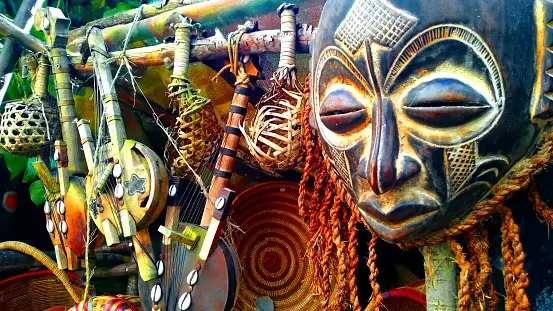
Celebrating the Diversity of African Masks In 2023? Are you ready to embark on a captivating journey through the rich and diverse world of African masks? In 2023, we celebrate the profound significance and cultural heritage of these remarkable art forms that have captivated people worldwide for centuries. From the vibrant colors to the intricate designs, African masks offer a window into the diverse cultures, traditions, and beliefs of the African continent. Join us as we explore the fascinating history, symbolism, and beauty behind these extraordinary creations.
Introduction
African masks are not mere objects; they are powerful cultural artifacts that embody the essence of African identity. These masks hold great significance in African societies, where they are used in various ceremonies, rituals, and performances. Each mask tells a story, reflects ancestral wisdom, and connects the present generation with their roots. Let us delve into the captivating world of African masks and discover the beauty that lies within.
The History of African Masks
The history of African masks dates back thousands of years. The origins can be traced to ancient civilizations and tribal communities across the African continent. Masks were initially created for spiritual and religious purposes, serving as a bridge between the physical and spiritual realms. These sacred objects were believed to possess transformative powers and were used in initiation rites, harvest celebrations, and funerals.
Purpose and Symbolism
African masks serve multiple purposes within different cultural contexts. They are often used in initiation ceremonies to mark significant life transitions, such as the transition from childhood to adulthood. Masks can also represent deities, spirits, or ancestors, and are used to communicate with the spirit world. Additionally, masks may be employed in theatrical performances, storytelling, and social events to entertain and educate the community.
Types of African Masks
African masks come in various forms, each serving a distinct purpose. Let’s explore three primary categories of African masks:
Ritual Masks
Ritual masks are employed in religious and spiritual practices. They are believed to possess supernatural powers and are used to communicate with ancestral spirits or deities. These masks often feature elongated faces, intricate patterns, and striking designs that reflect the spiritual significance of the ceremonies in which they are used.
Ceremonial Masks
Ceremonial masks are associated with specific rites and rituals, such as weddings, funerals, and harvest festivals. They are intricately crafted and may display elements of animals, humans, or mythical creatures. These masks play a crucial role in preserving cultural traditions and strengthening community bonds.
Performance Masks
Performance masks are designed for entertaining and engaging audiences. They are commonly used in masquerades, dances, and theatrical performances. These masks are often visually striking, featuring bold colors, exaggerated features, and elaborate headpieces. Performance masks not only entertain but also convey moral lessons and social commentary.
\Materials and Techniques
African masks are crafted using a variety of materials and techniques that vary across regions. Wood is the most commonly used material, symbolizing the interconnectedness between humans and nature. Other materials include metal, clay, fabric, beads, and animal parts. Skilled artisans employ carving, painting, and embellishment techniques to create masks that are visually stunning and culturally significant.
Geographical Variations
The diversity of African masks is influenced by the vast geographical expanse of the continent. Different regions have distinctive mask styles, reflecting the cultural, linguistic, and historical diversity of the communities within them. From the bold and geometric designs of West Africa to the refined and elaborate forms of East Africa, each region offers a unique expression of artistic creativity and cultural identity.
Read More: How Does Satellite Radio Work In 2023
Famous African Mask Styles
Several African mask styles have gained global recognition for their exceptional artistry and cultural significance. Let’s explore a few renowned styles:
Dan Masks
Originating from the Ivory Coast and Liberia, Dan masks are characterized by their elongated faces, high foreheads, and delicately carved features. These masks are associated with initiation rituals and are believed to connect the living with the spirit world.
Senufo Masks
Senufo masks, hailing from the Ivory Coast, Mali, and Burkina Faso, are known for their striking geometric patterns and intricate designs. They are primarily used in ceremonies related to fertility, agriculture, and initiation.
Baule Masks
Baule masks, originating from the Ivory Coast, are revered for their serene expressions and refined craftsmanship. These masks often depict idealized human faces and are utilized in important social events and rituals.
Dogon Masks
Dogon masks, associated with the Dogon people of Mali, are renowned for their complex symbolism and ancestral representations. These masks are used in various ceremonies, including funerals, harvest celebrations, and initiations.
Yoruba Masks
Yoruba masks, originating from Nigeria and Benin, embody the spiritual beliefs and mythology of the Yoruba people. These masks are intricately carved and painted, often depicting deities and ancestral figures.
African Masks in Contemporary Art
The influence of African masks extends beyond traditional contexts and has found its way into contemporary art. Many artists draw inspiration from African mask aesthetics, incorporating them into their artwork as a means of cultural exchange and celebration. This fusion of traditional and modern elements not only breathes new life into African mask traditions but also fosters a deeper appreciation for African art globally.
The Global Impact of African Masks
African masks have captured the imaginations of people worldwide, transcending cultural boundaries. Museums, galleries, and art enthusiasts embrace these masks as valuable artistic and cultural treasures. Their vibrant colors, intricate details, and deep cultural meanings have made African masks highly sought after by collectors and art enthusiasts alike.
Collecting African Masks
For those captivated by the beauty and significance of African masks, collecting these art pieces can be a rewarding endeavor. When collecting African masks, it is essential to understand their cultural context, authenticity, and ethical sourcing. Engaging with reputable dealers and experts can help ensure the preservation and respectful acquisition of these invaluable cultural artifacts.
Preserving African Mask Traditions
In a rapidly changing world, preserving African mask traditions is of paramount importance. Local communities, organizations, and cultural institutions play a vital role in safeguarding and promoting these traditions. Through education, documentation, and support for indigenous artisans, we can contribute to the continuity and appreciation of African mask-making practices for generations to come.
Conclusion
In 2023, we celebrate the vibrant and diverse world of African masks, paying homage to their profound cultural significance. From the spiritual rituals to the theatrical performances, these masks encapsulate the essence of African traditions and artistic expressions. Let us embrace the beauty, symbolism, and storytelling embedded within African masks, fostering a deeper understanding and appreciation for the rich tapestry of African culture.












6 Comments